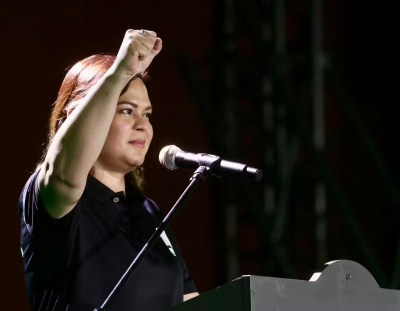With 317 congressional seats and nearly 18,000 local positions at stake, the May 12 midterm election results in the Philippines mean different things to people across the archipelago. But even a few hours after the unofficial results came in, the brute facts had already become clear.
Local elections for municipal and city mayorships, provincial governorships and congressional seats predictably produced victories for entrenched local “dynasties”. The advantages of incumbency – control over the patronage resources and regulatory powers of the state – ensured reelection for many sitting mayors, governors and congress members.
Midterm elections in the Philippines also include half of the seats in the nationally elected 24-member Senate. They thus serve simultaneously as tests for presidents halfway through their single six-year terms and previews of the next presidential election, in this case in 2028.
The latest mid-terms have been notable for their – ultimately ambiguous – implications for a major family feud at the top of the country’s politics. This feud pits the family of current president Ferdinand “Bongbong” Marcos Jr against that of his vice president, Sara Duterte.
The elections have failed to strengthen either family decisively, so their bitter rivalry is likely to continue throughout the remainder of Marcos’s term.
This family feud dates back to late 2021. At that time, Duterte agreed to run as Marcos’s running mate for presidential elections the following year despite her clear lead in nationwide voter preference surveys.
The Marcos-Duterte ticket won a landslide victory. They benefited from the endorsement and assistance of the incumbent president, Rodrigo Duterte, whose enduring popularity extended to his daughter Sara.
But following Marcos’s inauguration in late June 2022, a rift between the two families began to open up. Marcos settled into his presidential role and began to distance himself from the signature policies of his predecessor.
Instead of cultivating close ties with China, Marcos strengthened relations with the US. And instead of continuing Duterte’s so-called “war on drugs”, Marcos publicly spotlighted corruption in the Philippine National Police (PNP).
By 2024, Marcos began to signal his government’s willingness to cooperate with the International Criminal Court in its investigation of Duterte’s role in the thousands of extrajudicial killings undertaken in the war on drugs. Then, in March 2025, Duterte was arrested and transferred to The Hague. He is due to stand trial in the coming months.
Relations between the president and his vice-president have also broken down. Sara Duterte resigned from her cabinet post in 2024 amid corruption allegations, with subsequent months seeing escalating public hostilities between Marcos and herself. These included claims of death threats and assassination plots.
The House of Representatives voted by a clear majority to impeach Duterte in February 2025, setting the stage for a Senate trial later in the year. Against this backdrop, the midterms served as a kind of pre-trial proxy war between the two families.

The Dutertes fielded ten candidates for Senate, the so-called “Duterten.” They also endorsed two of the 12 candidates in the Marcos-backed Alyansa para sa Bagong Pilipinas (Alliance for a New Philippines). The campaign was dominated by mudslinging between the two camps in the media and on social media. And the final results have proved decidedly mixed.
On the one hand, pro-Duterte voters came out in a show of force to support candidates in the slate backed by the former president. This was foreshadowed by Marcos’s declining popularity following the arrest of his predecessor and the impeachment of his vice-president.
Longtime Duterte lieutenant, Christopher “Bong” Go, won reelection and the most votes of all candidates. Duterte’s former police chief, Ronald “Bato” dela Rosa, also secured another term with a third-place showing.
The sixth-placed winner was Rodante Marcoleta, another Duterte-backed candidate. He is a television broadcaster and member of the Iglesia Ni Cristo, an independent church whose nearly 3 million members have long been viewed as a single solid voting bloc.
Two Alyansa candidates, Imee Marcos, the president’s estranged sister, and Camille Villar, daughter of wealthy real-estate mogul and former senator Manuel “Manny” Villar, also won seats with the explicit blessings of the Dutertes.
On the other hand, the Marcos camp won more seats and some added strength in its battle with the Dutertes for control of the Senate ahead of Sara Duterte’s trial. Erwin Tulfo, a popular television news anchor and Marcos’s former secretary of social welfare and development, won the fourth-place seat.
He was accompanied by four former senators also affiliated with Alyansa. These included ex-PNP chief Panfilo “Ping” Lacson, longtime television personality Vicente “Tito” Sotto III, Pia Cayetano with her base in wealthy Taguig City, and former action film star Lito Lapid.
But, overall, the mid-terms do not seem to have improved the prospects for the successful conviction of Sara Duterte. Alongside the winning Alyansa candidates, voters also returned two prominent opposition candidates, Paolo “Bam” Aquino and Francis “Kiko” Pangilinan, to the Senate. They oppose both the Marcos administration and the Duterte camp.
At the same time, there are questions about the allegiances of several of the 12 senators already seated. This adds an additional challenge in the search for the 16 senators required to secure impeachment.

Duterte – and her father, just re-elected as Davao’s mayor while awaiting trial in The Hague – also still enjoy support among many voters, especially in their southern home base in Mindanao.
The 24 elected members of the Senate are sensitive to public opinion and their own reelection prospects in 2028 and beyond. So, many of them will probably choose to hedge their bets and see where the winds are blowing as the trial unfolds.
The family feud dominating the national political scene looks set to remain unresolved over the months and years ahead.
John Sidel is professor of international and comparative politics, London School of Economics and Political Science
This article is republished from The Conversation under a Creative Commons license. Read the original article.

